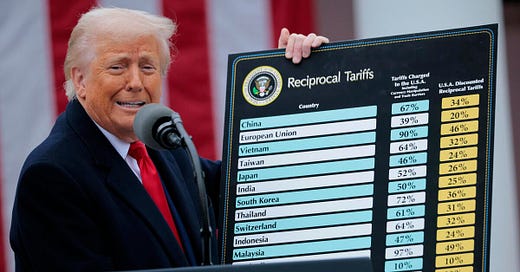Woke Watch Canada is a reader-supported publication. Please consider becoming a paying subscriber or making a one-time or recurring donation to show your support.
“The chaotic and inconsistent nature of Trump’s second-term policy to date can be criticized. But when it comes to tariffs as a tool of economic statecraft in general, the gap between establishment rhetoric and actual government practice is big enough to drive a Chinese EV through.” – Why Tariffs Are Good - Tablet Magazine
By
I am not worried about trade, tariffs, or the economy. I am far more worried about expansionist radical Islam, the People's Republic of China, or getting stabbed in the heart by an upset member of the black community with poor impulse control (like 17-year old Auston Metcalf, who was killed last week – stabbed by a young black male at a track meet!).
Concerning Trump’s “Liberation Day” tariff announcement, the CBC tells us that “experts quickly noticed that (the reciprocal tariff numbers) don't add up.” I counted three “experts” cited by CBC, including Dmitry Grozoubinski, a trade consultant based in Geneva and author of Why Politicians Lie About Trade ... and What You Need to Know About It – a 2024 “bestseller” with 52 mostly favorable reviews on Amazon. Fair, but did the CBC need to reach out all the way to Geneva to find an expert who experts the way they prefer? Or am I being ungenerous? Maybe. However, I noticed no experts who expert in ways the CBC does not prefer. Experts of all stripes exist in this world, no matter how much the CBC tries to convince us that the TDS-approved are the only ones worth listening to. I shall return to the numbers that “don’t add up,” shortly.
But first, it is clear to me that the derangement runs far deeper than leftist media. Jesse Kline just wrote a TDS-tinged pearl-clutcher of an op-ed for the National Post about the “global economic crisis,” where he states histrionically:
“If the tariffs play out how virtually every economist thinks they will, resulting in job losses and significant increases in the cost of living, congressional Republicans will find it increasingly hard to support the president’s agenda without alienating their voters.”
Swap “economists” for “experts” and you have the National Post version of a CBC opinion column. “Virtually every economist”? Please Jesse. Your Trump Derangement Syndrome is breaking your brain. And this NP column of yours is bound not to age well. We will see. I’ll bring it up again in a few months' time.
Turning our attention to other experts who the CBC or Jesse Kline don’t seem to know about. At least three prominent American economists who are supportive of Trump’s tariff plans spring to mind: Oren Cass, the founder of American conservative think tank American Compass. Jeff Ferry, the Chief economist at the Coalition for a Prosperous America. Stephen Moore, a former Trump advisor and fellow at the Heritage Foundation. All three of these Trump supporting economists have variously expressed the notion that tariffs can strategically reshape U.S. economic priorities.
Further, according to Victor Davis Hanson — a senior fellow at the Hoover Institution — who regardless of being ignored by legacy media and TDS wankers, is a major thinker eminently worth bothering with. Hanson has an entirely different take. Quite the opposite of the catastrophizing contingent, he characterizes the actions of the Trump administration as counter-revolutionary. Hanson reminds us that the U.S. is running a completely unsustainable 37 trillion dollar national deficit, a one trillion dollar annual trade deficit, and has not had balanced trade for 50 years. Trump’s agenda is not coming out of nowhere, clearly something has to give. Asymmetrical unfair illiberal trade is not sustainable.
In Hanson’s view the U.S. economy has been impaired by trade deficits and manipulation by foreign actors, such as the undervaluing of currency or the subsidization of exports. But even so, Trump’s tariffs are meant to be more than an economic instrument, they have been deployed as a strategic measure to correct unfair practices concerning broader geopolitical imbalances. What has been happening for decades has not been free trade, but asymmetrical trade that has altered the greater political landscape. The spirit of Trump's trade measures are reciprocity, but according to the eggheads in Canadian legacy media, the calculation for arriving at reciprocal rates is flawed.
Even though each country has their own rate, Canadian analysts are quick to characterize the approach as one-size-fits-all. Kline went so far as calling it “back-of-the-napkin math,” which “doesn’t actually measure trade barriers at all.” His critique seems based on the discovery by economic analysts that Trump’s reciprocal rate for any given country is based on that country's exports to the U.S. minus their imports from the U.S. – which equals the trade deficit – and then, the deficit is divided by the country's exports, resulting in the reciprocal rate. The issue that many analysts have with this is that, according to them, a tariff based on trade deficits is not a reciprocal tariff but rather a preemptive tariff. Regardless of how one chooses to calculate or characterize things, there is no denying that the U.S. economy has been greatly disadvantaged by decades worth of asymmetrical trade. The tariffs themselves might not be enough to balance out the numbers, however, the diplomacy and deal-making they catalyze most likely will.
There is zero reason to be histrionic about any of this. Asymmetrical trade is not liberal, and it is not fair. It is definitely not free trade, however, with many countries now advocating for a zero tariff approach to trade with the U.S., for the first time in history, a true scenario of free trade (or something far closer to it than has previously ever existed), the desired outcome of the Trump administration, is the direction we may be headed. Yes, markets will be volatile during the transition. This means criticism from elites who own lots of stocks, whether they be right, left, or MAGA, is bound to erupt with an intensity and fervour that can only be so vigorously mustered by the self-interested monied classes.
But market volatility will be short-term. No matter how much the pundits and TDS idiots scream about “economic crises” and cite the specifics of temporarily declining stock valuations, the market will eventually settle. If Trump’s agenda is permitted to continue, if new and fairer deals are made with American trading partners, there is a great chance that a reset world economy will emerge, for the better of all, with less asymmetric, more liberal trade. A win-win.
How can I be so sure we should not worry about tariffs?
Well, why should we worry about tariffs? This might be the better question. As Trump has pointed out, countries like India and China have thrived in spite of the high tariffs they impose.
But further, there is no historical precedent of tariffs causing financial crises, yet there have always been tariffs and trade disputes between trading partners. It is a common misconception that President Hoover’s 1930 Smoot-Hawley Tariff Act caused or worsened the Great Depression. This is revisionist history. The stock market crashed in October of 1929. Smoot-Hawley was passed in the summer of 1930, in reaction to the crash, which was caused in great part by the irresponsible practices of Wall Street.
American author and academic Michael Lind penned an informative piece for Tablet Magazine where, after reminding readers that tariffs are something practically all nations impose on imports, he explained the motivating reasons for doing so:
“Governments are resorting to tariffs and industrial policy, not because their prime ministers and presidents flunked Econ 101, but because they do not want their economies deindustrialized by a flood of low-priced, state-subsidized Chinese imports.”
Lind makes clear that protectionist policies are widespread. They are a common economic instrument used by America, Canada, and all other nations both past and present. The media coverage concerning Trump’s “trade war” is not conveying this simple truth. All involved are far too busy being ridiculous and hysterical.
From Lind:
“The Chinese import threat is why Canada has levied a 100% tariff on imported Chinese EVs, along with a 25% surtax on Chinese steel and Chinese aluminum. The European Union has slapped electric vehicles made in China with tariffs ranging from 7.8% to 35.3%, on top of the standard European tariff of 10% for imported automobiles. India imposes tariffs of 70%-100% on imported electric vehicles from China and other countries.”
The Whitehouse put out the following statement in May of 2024, during the Biden administration, after imposing tariffs on major segments of Chinese industry:
“China’s forced technology transfers and intellectual property theft have contributed to its control of 70, 80, and even 90 percent of global production for the critical inputs necessary for our technologies, infrastructure, energy, and health care—creating unacceptable risks to America’s supply chains and economic security.”
The United Auto Workers (UAW) are fully in support of Trump’s agenda. President Shawn Fain has praised Trump’s tariffs on imported vehicles and auto parts. Fain sees Trump’s agenda as a much needed response to decades of “free trade disaster.” He feels Trump is taking a critical step to protect American manufacturing jobs. The UAW have issued multiple statements following Trump’s March 2025 announcement that a 25% tariff would be imposed on cars and parts. The Economic Policy Institute has estimated that NAFTA brought about the loss of 682,000 American auto jobs, it is no surprise that the UAW supports Trump’s tariffs.
The reason tariffs are dominating the news cycle has as much to do with Trump Derangement Syndrome as it does with people’s legitimate concerns over chaos in the markets. Trump’s rhetoric and bombasity does not help. However, according to Lind, the real reason for the imposition of tariffs by the former Biden administration, and by virtually all other industrialized nations, and now also the Trump administration, is that tariffs are a “belated course correction in response to the rise of China, which has been driven by U.S. companies that offshored manufacturing.”
Protectionist measures are common and needed. Trump is seeking to use these economic instruments to bring about a situation of fair and symmetrical trade, and to undo the damage of years of NAFTA. The loss to the American auto sector during the “free trade” era was massive. Big companies sold out American workers, and now those workers are demanding industry return to the U.S. None of this should be seen as a shocker, regardless of Trump’s high-voltage oratory. The legacy media fails time and again on this. They cannot do Trump. They simply cannot get over their TDS and so offer no balanced analysis. Thank God for pragmatic rational thinkers like Victor Davis Hanson and Michael Lind.
Thanks for reading. For more from this author read, Please Don’t Listen To Me
Follow Woke Watch Canada on X - @WokeWatchCanada
Or, by contributing to our Donor Box:







Trump’s real target is China. Think of that 300 billion in trade deficit with China as going directly from America to Communist China to build up China’s armed forces. It’s really quite crazy - America is paying for its number 1 enemy’s huge army expansion at the same time as its manufacturing heartland is being hollowed out as factories move to China. The meth addicts left get to buy cheap Chinese stuff at Walmart. Trump has no choice. He has to act
I’m so fed up with TDS. It’s gotten to the point I just tell people, I’m not interested in listening to your Trump hatred. It’s a bloody mental health problem in Canada.